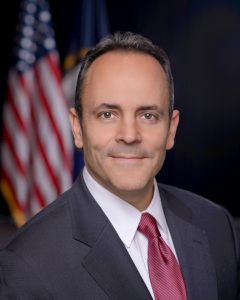 Gov. Matt Bevin testified last week before the House Judiciary Committee in support of House Bill 333, which seeks to set common sense limits on pain medication prescriptions in an effort to combat Kentucky’s opioid epidemic. The bill also has several measures to regulate, prohibit and punish the illicit possession, importation and trafficking of fentanyl, carfentanil and fentanyl derivatives.
Gov. Matt Bevin testified last week before the House Judiciary Committee in support of House Bill 333, which seeks to set common sense limits on pain medication prescriptions in an effort to combat Kentucky’s opioid epidemic. The bill also has several measures to regulate, prohibit and punish the illicit possession, importation and trafficking of fentanyl, carfentanil and fentanyl derivatives.
Introduced by Rep. Kimberly Moser and a group of five bipartisan co-sponsors, this legislation seeks to prevent the creation of new addicts by reducing overexposure and oversupply of opioids in acute care settings. Recent statistics show that Kentucky ranks third among all states in opioid addiction, with a rate double the national average.
“Until we have a frank conversation—as it relates to everything from the production, prescription, dissemination, and prosecution of opioids—we’re not going to fix the problem,” said Gov. Bevin. “With the exception of intentional drug dealers, most of the people who are complicit in this didn’t start out trying to be complicit in something that has been so crippling to our nation and to the Commonwealth.”
In accordance with Center for Disease Control and Prevention (CDC) guidelines, House Bill 333 would prohibit a practitioner from issuing a prescription for more than a three-day supply of a Schedule II controlled substance intended to treat pain as an acute medical condition.
Certain exemptions would apply for cancer patients, individuals diagnosed with chronic pain, those in narcotic treatment programs, patients receiving end-of-life care, and other situations deemed medically necessary.
Studies compiled by the National Institute on Drug Abuse illustrate the importance of decreasing exposure to opioids: 86 percent of injection drug users took opioid pain relievers non-medically prior to using heroin, 75 percent of individuals abusing opioids used a prescription drug as their first opioid, and incidence of heroin initiation is 19 times higher among those using non-medical pain relievers versus those who did not.
“This addiction is everywhere, and we have to make it harder to get addicted,” said Gov. Bevin. “We don’t have the luxury of being able to pretend this doesn’t exist.”
 Weather
Weather Traffic
Traffic @LouisvilleDispatch
@LouisvilleDispatch @LouisvilleDisp
@LouisvilleDisp Subscribe
Subscribe